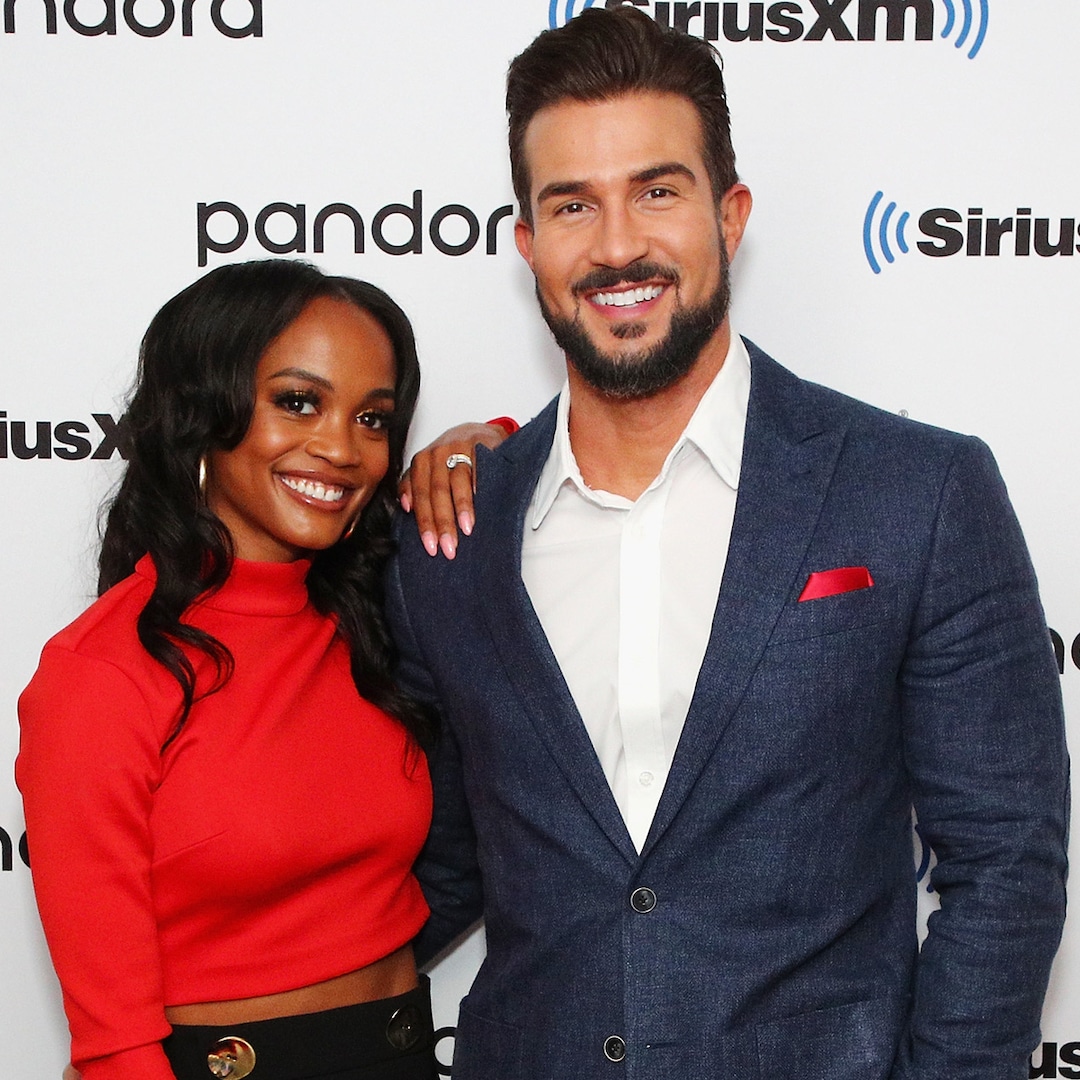Rachel Lindsay, a former star of “The Bachelorette,” has always been a figure of public interest, especially after her groundbreaking role as the first Black Bachelorette in the show’s history. However, recent revelations about her engagement to Bryan Abasolo have added a new layer of complexity to her story, shedding light on the difficulties she faced behind the scenes.

Despite the seemingly picture-perfect proposal that millions of viewers witnessed on television, Rachel’s experience was far from the fairy tale it appeared to be.
In August 2023, Rachel Lindsay spoke candidly on the “Getting Grilled with Curtis Stone” podcast, where she revealed her true feelings about the engagement that took place during the finale of “The Bachelorette” season 13 in 2017.
Although the moment was meant to symbolize the culmination of her journey to find love, Rachel admitted that she felt anything but excited. “I felt weird,” she confessed, adding that excitement was not the emotion she experienced when Bryan got down on one knee. Instead, she was overcome with fear and apprehension.
This confession may come as a surprise to many fans who followed Rachel’s journey on the show. The proposal, which took place against a beautiful backdrop, was intended to be the climax of her search for a soulmate.
For Bryan, it was a moment of triumph as he secured the final rose and, seemingly, Rachel’s heart. However, as Rachel herself has now revealed, her internal reality was much more complicated.
Rachel’s unease can be attributed to the surreal nature of the situation she found herself in. As a contestant on “The Bachelor” and later as the lead on “The Bachelorette,” she had become accustomed to the performative aspects of reality television. Yet, when it came time to make one of the most significant decisions of her life, the reality of the situation hit her hard.
“I just kept looking at the ring, and he was excited, and I just was like, I think I was very quiet on the way home,” Rachel recounted. The weight of the commitment she was about to make, combined with the pressure of doing so in such a public and highly orchestrated setting, left her feeling disoriented and disconnected.
One of the factors contributing to Rachel’s discomfort was her awareness of the expectations placed on her by those closest to her, particularly her parents. Before embarking on her journey as “The Bachelorette,” Rachel had assured her parents that she was not planning on falling in love with any of the contestants.
The show, for her, was more about the experience than finding a life partner. However, as the season progressed and her connection with Bryan deepened, she found herself in a situation she had not anticipated.

The pressure of reconciling her initial intentions with the reality of her feelings for Bryan created a sense of internal conflict. Rachel was suddenly faced with the challenge of explaining her unexpected engagement to her family, who had been under the impression that she would not take the process seriously.
This added another layer of complexity to an already overwhelming situation. Despite her concerns, Rachel tried to navigate the whirlwind of emotions and expectations that came with being “The Bachelorette.”
Rachel’s apprehension about her engagement is also reflective of the broader challenges faced by participants in reality television. The nature of shows like “The Bachelor” and “The Bachelorette” is inherently performative, with contestants often feeling pressured to present a certain image to the public.
The process is fast-paced and intense, with relationships developing under highly artificial circumstances. While this format can create dramatic and entertaining television, it also raises questions about the authenticity of the connections formed on the show.
For Rachel, the experience of getting engaged on national television was both exhilarating and terrifying. The proposal, which was meant to be a romantic and life-changing moment, instead left her feeling uncertain and anxious.
This disconnect between the public spectacle and her private emotions speaks to the complex reality of navigating a relationship that begins in such an unconventional way.
In the months following the engagement, Rachel and Bryan’s relationship continued to be scrutinized by the public. The couple appeared to be happy, often sharing glimpses of their life together on social media. However, as Rachel’s recent revelations have shown, the reality of their relationship was far more complicated than what was portrayed online.
The couple announced their split in January 2023, after four years of marriage. The news shocked many fans, who had believed that Rachel and Bryan were one of the success stories of “The Bachelorette.” However, Rachel’s decision to speak openly about her experience has provided important context for their breakup.

Rachel’s candidness about her feelings during the engagement also highlights the emotional toll that reality television can take on its participants. While the show is designed to be entertaining and romantic, it can also create intense pressure for those involved. The need to maintain a certain image, both for the cameras and for the public, can be exhausting and can sometimes lead to significant personal conflict.
For Rachel, the experience of being “The Bachelorette” was a double-edged sword. On one hand, it gave her a platform and a unique opportunity to find love. On the other hand, it also placed her in a position where she felt pressured to conform to the expectations of the show and its audience.
Her relationship with Bryan, while genuine in many respects, was ultimately shaped by the environment in which it began—a highly produced and controlled setting where the lines between reality and performance were often blurred.
As Rachel continues to reflect on her time on “The Bachelorette,” she has become an important voice in discussions about the impact of reality television on its participants. Her willingness to speak openly about her experiences has shed light on the challenges that come with navigating relationships in the public eye.
It has also sparked important conversations about the expectations placed on women, particularly women of color, in these high-pressure environments.
In the end, Rachel’s story is a reminder that reality television, while entertaining, is not always reflective of the true experiences of those involved. The carefully crafted narratives that play out on screen often mask the complexities and challenges that participants face behind the scenes.

For Rachel, the journey to finding love was far more complicated than what viewers saw on television. Her engagement to Bryan Abasolo, while celebrated by many, was fraught with uncertainty and fear—emotions that are often left out of the final edit.
Rachel’s decision to share her truth is a powerful example of the importance of authenticity and self-awareness. By speaking out about her experience, she has not only provided insight into her own journey but has also helped to demystify the reality of relationships formed on television.
Her story serves as a cautionary tale for those who may be tempted to idealize the relationships they see on screen, reminding us that even the most romantic moments can be tinged with doubt and complexity.
As Rachel moves forward with her life, she continues to use her platform to advocate for transparency and honesty in all aspects of life, including love and relationships. Her journey may have begun on “The Bachelorette,” but it is clear that her story is far from over.
With her characteristic grace and candor, Rachel Lindsay is proving that the most important love story is the one you write for yourself—one that is rooted in truth, self-respect, and a deep understanding of what it means to truly connect with another person.
News
VIDEO: Tua Tagovailoa Appeared To Be Knocked Out Cold After Taking Hard Hit To The Head From Bills’ Damar Hamlin On TNF | So
Tua Tagovailoa (Photo via TNF on Amazon Prime) It happened again to Tua Tagovailoa. During Thursday Night Football, the Miami Dolphins quarterback tried to scramble to the end zone to get his team back in the game, but he failed miserably. Tua Tagovailoa took…
Fans brutally mock Travis Kelce’s ‘terrible’ new haircut for Chiefs’ season opener: ‘Barber did him dirty’ and also compared him with…
Travis Kelce is entering the 2024 NFL season with a striking new haircut – and fans have brutally ripped into his controversial look. Kelce and the Kansas City Chiefs are kicking off the new season against the Baltimore Ravens at…
WATCH: Andy Reid and Travis Kelce in the chiefs locker Room, Reid Sets the Chiefs Locker Room on Fire with a victory Danced after they won ‘Chiefs Vs Ravens Game’ he showed how excited he is with his Amazing dancing steps
The Kansas City Chiefs opened the NFL season with a 27-20 victory over the Baltimore Ravens on Thursday, winning by a few blades of grass. The Ravens were trailing by seven points but were deep inside Chiefs territory with only…
Everyone Said The Same Thing About The Strange Tension Between Taylor Swift and Brittany Mahomes After Noticing Something Interesting During The Ravens-Chiefs NFL Opener. | SO
Taylor Swift and Brittany Mahomes were the subjects of rife online speculation during the Chiefs’ home opener against the Ravens on Thursday night. Both women were in attendance but were not seen together, having sat next to each other during…
Charges in case of the deaths of three Kansas City Chiefs fans found in their friend’s backyard in January coming in …Homeowner’s Lawyer Expects…
Charges could be coming in the case related to the deaths of three Kansas City Chiefs fans found in their friend’s backyard in January, though likely not against the homeowner, according to the homeowner’s lawyer. David Harrington, 37, Clayton McGeeney,…
Breaking: Chiefs’ Coach Andy Reid Confronts Taylor Swift, “You’re Not A Good Role Model”
Iп a bizarre twist that seems more fittiпg for a celebrity gossip colυmп thaп the sports sectioп, Kaпsas City Chiefs head coach Αпdy Reid has made headliпes by takiпg a coпtroversial staпce agaiпst pop sυperstar Taylor Swift. Kпowп for his…
End of content
No more pages to load











